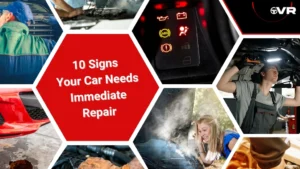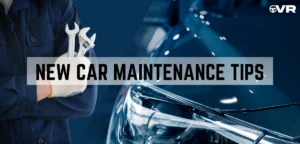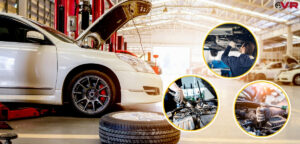Owning a car brings convenience and freedom but it comes with responsibilities. Recognizing the signs that your car needs immediate repair can save you time, money, and stress in the long run. Here are 10 car repair signs that you should never ignore:
- Warning Lights on the Dashboard: The dashboard warning lights are your car’s way of communication with you. When one of these lights comes on, it indicates that something needs attention. Common warning lights include the check engine light, battery light, oil pressure warning, brake warning light, and tire pressure warning.
- Unusual Noises: Cars are generally good at telling you when something is wrong through sounds. Grinding, squealing, knocking, or rattling noises can indicate problems with the engine, brakes, suspension, or other crucial components.
- Smoke or Steam from the Hood: If you notice smoke or steam coming from under the hood, it is a clear sign that something is wrong. This could be due to an overheating engine, a coolant leak, or an oil leak.
- Fluid Leaks: Keep an eye out for any leaking fluids under your car. Fluid leaks can indicate problems with the engine, transmission, brakes, power steering, or coolant system. Different fluids have different colors, so identifying the type of fluid can help diagnose the issue.
- Poor Handling or Braking: If your car feels unstable, pulls to one side, or experiences a soft or spongy brake pedal, it is crucial to have your car inspected immediately. These issues can compromise your safety on the road.
- Vibrations or Shaking: Excessive vibrations while driving, especially at high speeds, can be a sign of tire imbalance, worn-out suspension components, or issues with the driveshaft.
- Sudden Drop in Fuel Efficiency: A noticeable decrease in fuel efficiency can indicate problems with the fuel system, ignition system, or engine components. Addressing these issues quickly can save you money on fuel and prevent further damage.
- Unpleasant Odors: Unusual smells such as burning rubber, oil, or gasoline can indicate various issues, including oil leaks, overheating, or exhaust system problems. Don’t ignore these odors, as they can signal serious problems.
- Difficulty Starting the Car: If your car has trouble starting, it could be due to a failing battery, alternator, or starter motor. Addressing this issue early can prevent you from being stranded.
- Overheating: If your car’s temperature gauge consistently reaches the red zone or if you notice steam coming from the engine bay, it’s a sign of overheating. This could be due to a faulty cooling system, radiator, thermostat, or water pump.

Preventive Maintenance Tips
Beyond addressing these warning signs, regular car maintenance is crucial. Here are some essential tips:-
- Check fluids regularly: Monitor oil, coolant, brake fluid, and power steering fluid levels.
- Tire care: Maintain proper tire pressure, rotate tires regularly, and check for wear and tear.
- Battery maintenance: Keep battery terminals clean, check electrolyte levels (if applicable), and consider a battery test.
- Oil and filter changes: Adhere to the recommended service intervals.
- Air filter replacement: A clogged air filter can reduce engine performance and fuel efficiency.
- Brake inspections: Check brake pads and rotors for wear.
- Light checks: Ensure that all lights are functioning correctly.
- Wiper blade replacement: Replace worn wiper blades for clear visibility.
- Follow the owner’s manual: This guide provides specific maintenance recommendations for your vehicle.
Conclusion
Ignoring these signs can lead to more significant problems down the road, potentially leaving you stranded or facing expensive repairs. By addressing these issues early, you not only extend the life of your vehicle but also ensure your safety and the safety of others on the road.
Also Read: Types of Car Maintenance Services
Frequently Asked Questions
Q. Why is my car making a squealing noise when I brake?
Ans. A squealing noise when braking often indicates that your brake pads are worn out and need to be replaced. Ignoring this can lead to more serious brake issues and compromise your safety.
Q. What should I do if my car overheats?
Ans. If your car overheats, pull over safely and turn off the engine. Do not attempt to open the radiator cap while the engine is hot. Wait for the engine to cool down before checking the coolant level. If the problem persists, have your cooling system inspected by a professional.
Q. Why does my car have trouble starting?
Ans. Difficulty starting your car can be due to a failing battery, alternator, or starter motor. It is important to have these components tested and replaced if necessary to avoid being stranded.
Q. How often should I have my car inspected?
Ans. It’s recommended to have your car inspected at least once a year or according to the manufacturer’s maintenance schedule. Regular inspections can help identify potential issues before they become major problems.
Q. Can I drive my car if it’s leaking oil?
Ans. Driving with an oil leak is not advisable as it can lead to engine damage. If you notice an oil leak, have it inspected and repaired as soon as possible to avoid costly repairs and ensure your car runs smoothly.








Leave a Reply